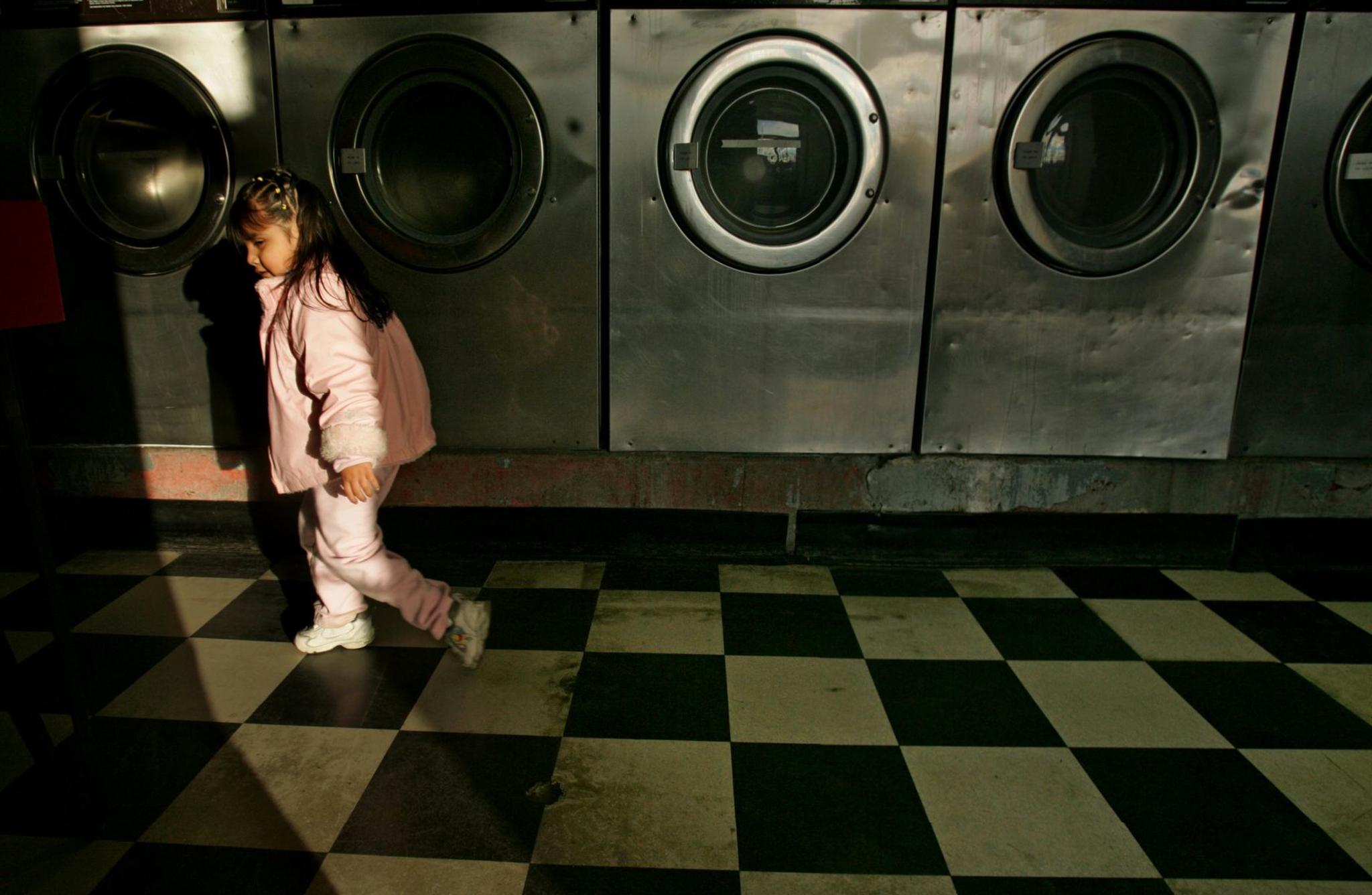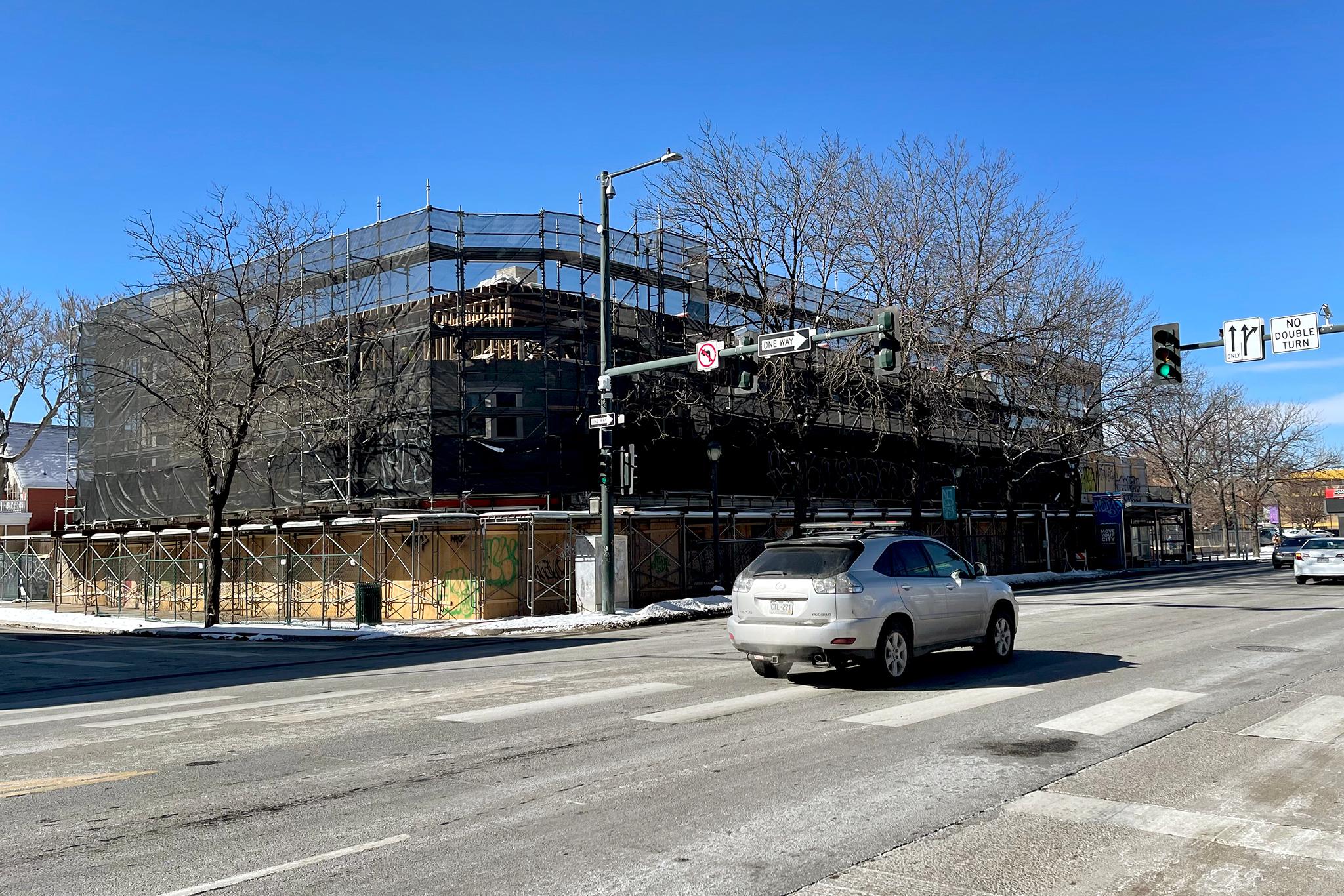Scaffolding surrounds the old Smiley's Laundromat site at Colfax Avenue and Downing Street.
The building, with apartments above the long-shuttered laundromat, has sat empty since Smiley's closed in 2013. Ever since, preservationists, Capitol Hill neighborhood activists, and developers wrestled over its demolition and future.
Work started earlier this week. As of Friday, the façade was still intact.
The 1930s building, which dates back to the era when streetcars ran up and down Colfax, housed Smiley's Laundromat for over three decades, according to Historic Denver in 2017.
"During the city's efforts to create Main Street zoning, city planners identified the building as the type of building most appropriate for Colfax, with a strong street wall, ground-floor transparency, and parking in the rear, not the front," the group wrote. "The building's Art Deco detailing is also admired, earning it a spot in Historic Denver's guidebook on Colfax Avenue. The Smiley's Building is among the ranks of quiet, simple, and important 'background buildings' that we so often take for granted, but which offer a sense of identity, quality, and continuity on our local main streets."
Calvin Williamson, who grew up in northeast Denver, used to visit his friend who lived in an apartment above the laundromat. When laundry piled up, Williamson's mom would take trips to Smiley's to do multiple loads at once. The building lingers in his memory.
"I just remember how incredible that place was, because it was like a melting pot," he said. "I mean, it was the closest thing to maybe like Manhattan, New York. You'd see all kinds of folks. You would see street people. You'd see rich white ladies washing their fancy rugs in those fancy machines, kids hanging out. It was definitely a community hub."
There were so many washing machines and dryers that customers never had to wait, but in the off chance they did, there was a machine with cheap coffee and hot cocoa.
"At times, it seemed to be kind of infamous," Williamson added, noting that a 24-hour-a-day laundromat on Colfax had a seedy side. "But it was quite an institution back in the day."

The laundromat's ownership has changed hands over the years, and plans for its demolition came and went and came again, sparking community opposition.
A few years back, the city's Landmark Preservation office noted its potential as a historic landmark, and many neighbors agreed. Historic Denver didn't fight for landmark status, and ultimately the site was approved for demolition. Afterward, the preservation group did work with owner, Consolidated Investment Group, on putting the old structure to new use.
"Unfortunately after several months of brainstorming and dialogue, the owner's concerns about the demands of their preferred program and parking needs outweighed the preservation concerns, and they have decided to move forward with plans for demolition," Historic Denver wrote.
In 2017, CIG announced it would soon be replacing the building with a seven-story apartment complex. Then work stalled and neighbors watched the building's façade fall into disrepair. In the meantime, the company rented short-term leases on apartments at the Route 40 Complex through June 2021.
The current owner is listed as Route 40 RE LLC, a company formed by CIG, according to public filings. Online, the developer said the new project, also called Route 40, will have 210 apartments and over 5,000 square feet of retail space. A rendering shows a modern building with no hints of the old art deco structure, and the latest plans submitted to the city show the façade will be torn down. The company has not responded to Denverite's requests for comment.
After scaffolding went up in recent days, neighbors started clamoring about preservation again.
Residents began calling and writing the registered neighborhood organization Capitol Hill United Neighborhoods with a mix of concerns. Some neighbors want more affordable housing at all costs and object to preservationist projects, while others hope to see Denver's architectural character preserved and adapted for new uses.
CHUN itself has advocated for preservation and is now looking to the future and working with the building's owners.
"We look forward to hearing from the architects, the property owner, and other stakeholders to shape the future of the site," said CHUN president and executive director Travis Leiker.
"One of my observations during the course of being president of Capitol Hill United Neighborhoods is that conversations around preservation and new development often take place in a series of absolutes," he said. "And where we have been successful as an organization is by leaning into those conversations and facilitating both dialogue and then building consensus."
Williamson, who now lives in New York, visits Denver several times a year. He's surprised by how quickly the small city of his youth has been replaced by buildings that don't look all that sturdy and large-city mentality.
"I appreciate the change," he said. "I appreciate the new vitality that's on Colfax. But I'm also bothered that a lot of history is being wiped away. It's almost as if when it comes to new development, they take the human element away. It's all about maximum impact, maximum profits. It's just unfortunate that they can't find a way to better balance themselves a better nuance between profits and keeping things human and history."











